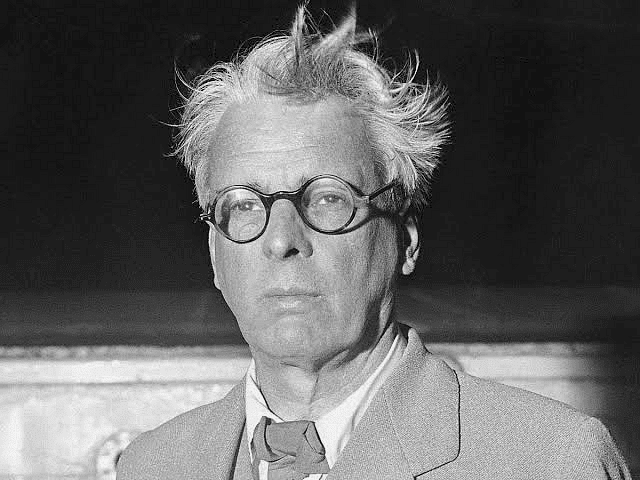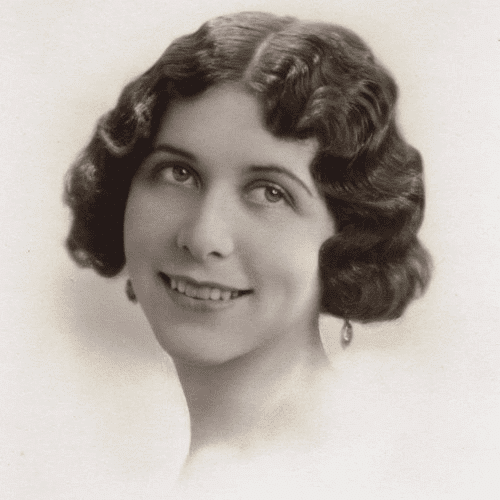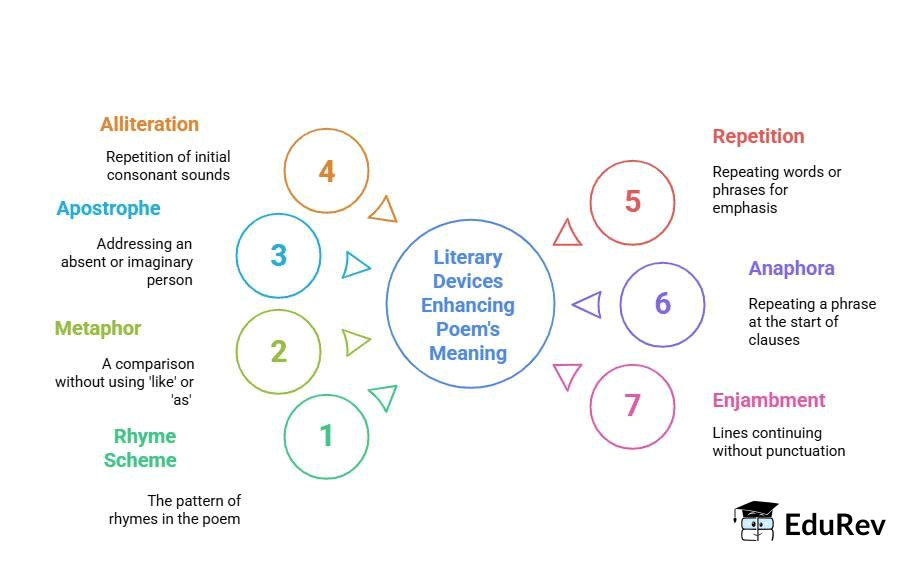For Anne Gregory Summary Class 10 English First Flight Chapter 10
| Table of contents |

|
| About the Poet |

|
| Key Points of the Poem |

|
| Detailed Summary |

|
| Theme/ Message |

|
| Literary Devices |

|
| Difficult Meanings |

|
About the Poet
- William Butler Yeats (1865-1939) was an Irish nationalist, born in 1865 in Sandymount, Dublin, to an artistic family.
- His poetry was inspired by Irish mythology and evolved from traditional forms to include elements of realism and spirituality.
- Yeats had a strong interest in folklore and mythology, which shaped many of his poetic themes.
- He experimented with various poetic forms and styles, placing importance on rhythm and traditional structures.
- In 1923, he received the Nobel Prize for Literature.

Key Points of the Poem
- The poet talks to a young girl named Anne Gregory, explaining that a young man will not love her for who she is, but for her looks, particularly her yellow hair.
- The lines suggest: "A young man, / Overwhelmed by those lovely honey-coloured / Waves at your ear, / Will never love you for yourself / But for your yellow hair."
- Anne responds by saying she could dye her hair brown, black, or even red to find out if young men would love her for her true self, not just her yellow hair.
- There was an old religious man I heard / Last night saying / He found a text that shows / Only God, my dear, / Could truly love you for who you are / And not just for your yellow hair.
Detailed Summary
Stanza 1
Never shall a young man,
Thrown into despair
By those great honey-coloured
Ramparts at your ear,
Love you for yourself alone
And not your yellow hair.
The poem starts with the speaker talking to Anne Gregory, looking into the tricky nature of love and attraction. The speaker points out how Anne’s beautiful honey-coloured hair attracts men, implying that her outer beauty may prevent true connections. They wonder if any man can truly love Anne for who she is inside, rather than just for her looks.
Stanza 2
But I can get a hair-dye
And set such colour there,
Brown, or black, or carrot,
That young men in despair
May love me for myself alone
And not my yellow hair.
In the second stanza, Anne responds to the speaker by emphasizing that outer appearances are superficial and unimportant. Using her hair as an example, she suggests that external beauty, like hair color, can easily be changed and is therefore not genuine. Anne asserts that anyone who loves her must see beyond her outward appearance and appreciate her true self. She believes that genuine love should focus on her character rather than her physical attributes, such as her yellow hair.
 Stanza 3
Stanza 3
I heard an old religious man
But yesternight declare
That he had found a text to prove
That only God, my dear,
Could love you for yourself alone
And not your yellow hair.
In the final stanza, the speaker recalls a conversation with an old religious man who stated that only God could love someone for who they truly are, rather than just their outer beauty. This underlines the idea that people often focus on looks and miss the true essence of a person. The speaker concludes that only God can truly love Anne unconditionally, without being influenced by her beauty.
Theme/ Message
Theme
- Conventional Ideas of Beauty: The idea of beauty is often shaped by cultural norms, creating a limited view. Light hair is seen as beautiful, while dark hair is viewed as less appealing. This belief is widespread, and many, including Anne Gregory, accept it without question. However, the poet challenges this view in 'For Anne Gregory,' suggesting that real beauty comes from within, not just looks. Anne's reaction to this idea, however, is unclear.
- Men's Judgement Based on Outer Appearance: The poet criticises societal expectations that make men judge women based solely on their looks, ignoring their inner worth. He encourages men to value women for their character instead of just their appearance. The poet sees Anne's inner beauty but doubts if her peers will recognise it.
- Universal Truth Told by a Wise Man: An "old religious man" represents wisdom. He conveys a universal truth: only God truly knows and loves people for who they are beyond their looks. God's love for Anne is based on her kind character, not her appearance, highlighted in the line, "only God, my dear, could love you for yourself alone and not your yellow hair."
Message
- True love transcends physical appearance: The poem portrays that real love goes beyond outer beauty and explores the deeper qualities of a person.
- Inner beauty holds greater value: True love is founded on a person's inner beauty, highlighting the significance of appreciating character over mere looks.
- Divine love is selfless: The poem suggests that only God can offer unconditional love. Unlike humans, who may be blinded by appearances, God loves people for their true selves, beyond physical traits.
Literary Devices

- Rhyme Scheme - The rhyme scheme of the poem is abcbdb.
“But I can get a hair-dye a
And set such colour there, b
Brown, or black, or carrot, c
That young men in despair b
May love me for myself alone d - Metaphor - A metaphor is a literary device used to represent a comparison without using the words “like” or “as”.
In this poem, ‘honey-coloured ramparts’ acts as a metaphor for beauty and its protective traits. Yeats uses this metaphor to show how Anne Gregory’s beautiful hair protects her true self. - Apostrophe - An apostrophe is when a speaker addresses someone who isn’t present as if they can hear. In this poem, Yeats speaks to Anne Gregory, even though she is not there. This method helps convey the poem to her, an absent audience.
The speaker reflects on Anne’s qualities instead of talking directly to her. The repeated lines “Love you for yourself alone And not your yellow hair” indicate a focus on her traits rather than a direct conversation.
Note:
Some students raised doubts on this device. So here is some more of explanation on the use of this device.
There is a use of apostrophe as a poetic device in the poem. However, it’s important to note that the term “apostrophe” in poetry refers to a figure of speech in which the speaker addresses an absent or imaginary person, or an abstract idea, as if it were present and capable of responding.
In the poem, the speaker seems to be addressing someone directly, possibly a woman with yellow hair. The repeated lines “Love you for yourself alone And not your yellow hair” suggest a direct address to the person with the yellow hair. This can be considered a form of apostrophe, as the speaker is addressing the qualities of the person directly, in this case, the yellow hair.
So, while apostrophe is present in the poem, it is not in the form of the punctuation mark ‘ but rather in the form of a rhetorical device where the speaker is addressing someone or something directly. - Alliteration
Love you for yourself alone
The phrase ‘your yellow hair’ is an example of alliteration. The repeated ‘y’ sound highlights the link between love and identity.
Brown, or black - Repetition
- The term ‘yellow hair’ appears several times. This repetition stresses the idea of outer beauty. The word ‘despair’ is also repeated, showing the feelings of young men towards Anne Gregory.
- Anaphora - Repeating a word or phrase at the beginning of sentences or clauses that follow each other, done for emphasis
In the 3rd stanza – the second and third line
That he had found a text to prove
That only God, my dear, - Enjambment - Lines in a stanza ending going or continuing without any punctuation
In the 2nd Stanza: the 4th and the 5th Line
That young men in despair
My love me for myself alone
In the 3rd Stanza: 1st, 2nd and the 3rd Line
‘I heard an old religious man
But yesternight declare
That he had found a text to prove
Difficult Meanings
- Despair: hopelessness, here it means failure in succeeding or even expecting to get the love of Anne Gregory
- Ramparts: the tall, wide walls around a castle or fort, such as those of the Red Fort.
- Carrot: of carrot colour
- Yesternight: the previous night
- Text: matter, original writing
- Declare: to announce or tell others or claim
- Prove: to demonstrate and show the truth by evidence or argument
|
61 videos|617 docs|69 tests
|
FAQs on For Anne Gregory Summary Class 10 English First Flight Chapter 10
| 1. Who is the poet of "For Anne Gregory"? |  |
| 2. What are the key themes of the poem "For Anne Gregory"? |  |
| 3. What literary devices are used in "For Anne Gregory"? |  |
| 4. What is the detailed summary of "For Anne Gregory"? |  |
| 5. What message does "For Anne Gregory" convey? |  |
















